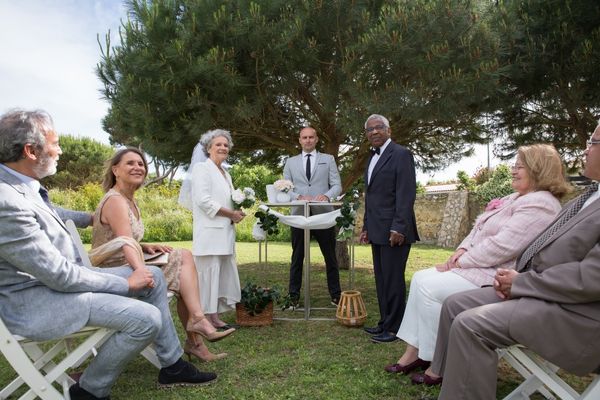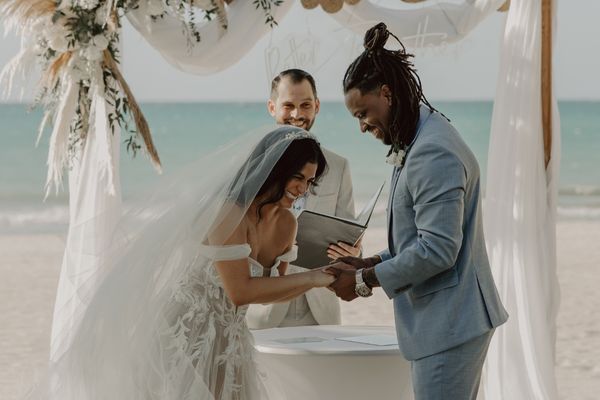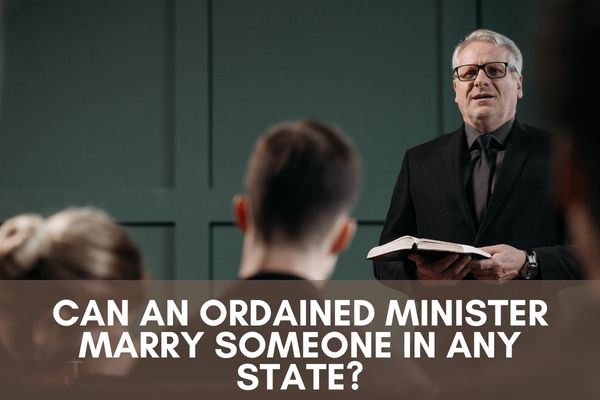“Can An Ordained Minister Marry Someone In Any State?” This is one of the most frequently asked questions about marriage, and we will focus on that in this article.
Firstly, ordination is the process by which someone becomes an ordained member of the clergy, elected or appointed to perform special religious, spiritual, or secular duties in alignment with a church or another denomination’s theology.
These duties might include officiating marriage ceremonies, funerals, and other rites like taking confessions or delivering sermons. Clergy members have a lot of titles that reflect their statuses, such as priests, priestesses, pastors, reverends, or ministers. All of these titles signify that a person has been ordained.
Can An Ordained Minister Marry Someone In Any State?
The United States has a clear division between church and state. The ability of an ordained minister to officiate marriages in a given state is not regulated by any one regulating body. Its formal status is handled differently in each state.
Given that his church is in the state where he is registered, an ordained minister can undoubtedly officiate at weddings there. The minister must speak with the state directly in other places.
An ordained minister can only perform marriage ceremonies in the state where he is registered or if his church is there.
Apart from the conditions above, the minister must contact the state directly before performing a marriage.
Sometimes, a minister might share a personal connection with a bride and groom, and they want the minister to perform their marriage ceremony.
Some people want someone officiating who understands who they are and has a past and future with the couple.
Because the wedding officiant plays an essential role in communicating these aspects to the guests, many couples ask friends, family, or someone they have a good relationship with to officiate the marriage.
The wedding might not be held in the state of their registration, and the minister might wish to accompany the couple to another state for the special day.
In this case, the minister must ensure their official documentation is current.
For example, their registration as an ordained minister for their state, congregation, or religious society will show their affiliation with the church and dedication to the process.
There is a distinct separation between church and state in the United States. There is no particular governing body that dictates an ordained minister’s ability to perform marriages in a specific condition, and each state treats this official status differently.
State Laws
Once the wedding date has been confirmed, the ordained minister must contact the state’s department responsible for granting the marriage license or other documentation.
He or she must present his documentation to request recognition in the state as a wedding officiant.
Many states in the United States of America allow ordained ministers to perform ceremonies with no additional documentation required; in contrast, other states require specific processes, such as licensing in that state, letters of support for their services, and registration with their governing body.
Some states, including New York and Nevada, require the ordained minister to become licensed according to their laws before being able to perform a wedding ceremony.
Each state has a governing body accountable for granting wedding officiants their licenses. The minister must adhere to their laws to conduct the marriage in that state. There might be a fee for this licensing process.
However, many states, such as Michigan, allow ordained ministers to perform marriages as long as they are registered in their states.
An ordained minister must often maintain a record of each marriage ceremony as a matter of law and official registration.
The couple can then confirm the marriage if their wedding certificate is misplaced. This official document reinforces the ordained minister’s duties and record as a wedding officiant.
This record may require the minister to perform their duties in the state where they are requesting recognition.

How to Become a Nonreligious Wedding Officiant
Rules for becoming a nonreligious wedding officiant vary according to jurisdiction. Most states, counties, and cities allow a variety of nonreligious officiants, such as county officials or local officeholders, to perform weddings.
Some states also allow individuals to apply for special interim authority to marry couples.
Many states and counties allow a friend or family member to legally officiate at a wedding with the presence of an authorized person. Always check the specific laws in the area where the marriage will take place.
Research the marriage laws of your state. Many states have no specific provisions for authorizing nonreligious wedding officiants. Contact the appropriate department in your state, city, or county where marriage certificates are filed and ask if there is a process for authorizing nonreligious wedding officiants to perform marriages.
Contact the county clerk’s office or the city marriage bureau in the area where the marriage will occur. Ask if you are already qualified to officiate. Many jurisdictions have lists of city officials legally authorized to perform weddings.
In many areas, government officials and city employees can perform marriages without special authorization. For example, New York and New Jersey state laws say that various government officials are automatically permitted to officiate at weddings.
Apply for certification to perform marriages as a nonreligious officiant if your county or state allows it.
California allows anyone to apply for momentary authority as a “deputy commissioner of marriages” to officiate at a single wedding without religious credentials or affiliation. Alaska, Massachusetts, and some counties in Virginia also offer this alternative.
Ask an authorized person to perform the wedding ceremony with you. Find a secular, licensed officiant to assist you in completing the wedding ceremony. In many states, this will be enough for the ceremony to be legally recognized.

Is a Minister’s License Valid In Every State?
The First Amendment to the U.S. Constitution ensures religious freedom. Some jurisdictions require ministers to present proof of ordination and obtain a state license to protect the public from fraud in the guise of religion.
All states may recognize the minister’s ordination. Still, because these licenses represent a source of income for each state, there is a lack of reciprocity between the states or counties in one form.
Statewide Minister Licensing
According to American Marriage ministries, the following states and territories require ministers to be state-licensed:
Arkansas
Delaware
District of Columbia
Hawaii
Louisiana
Massachusetts
Minnesota
Nevada
New Hampshire
New York
Ohio
Oklahoma
Puerto Rico
Vermont
Virginia
West Virginia
Some counties within each state also require ministers to register with or be licensed by the county clerk. In these states, licensing creates a statewide legal record that establishes the validity of marriages performed by ministers.
The fees associated with licensing are an income stream for the state and each county. Reciprocity is not available.
County Minister Licensing
There is no state licensing requirement in the other states, and the Universal Life Church reports that even so, the counties within those states may require licensing. Just as in states that require statewide licensing, the county-issued license creates a record from which the validity of the minister’s actions may be determined. The license fees also represent a potential income source for the county that requires licensing, and reciprocity is not available where licensing is required.
Ministers Ordained Online
The leeway offered by the absolute freedom of religion in the First Amendment means that anybody can form a church.
There has been a rise in online ordinations using organizations, such as the Church of Universal Life, which offer online training tools and accessible guidance for ministers.
These non-denominational churches ordain people online so that they can officiate weddings for friends, family, and other members of society.
The state of North Carolina says that marriages may be performed by an ordained minister of any religious denomination, a minister authorized by a church, or a magistrate.
Correspondingly, a “church” is legally defined as an organization with a distinct legal existence, designated places of worship, regular congregations, and ordained ministers appointed after completing prescribed courses of study.
In other words, ministers can only perform a marriage in North Carolina if a “brick-and-mortar” church has ordained them.
The U.S. district court for eastern California refused to rule on the validity of the motives of such organizations, religious or otherwise and ruled in favor of such a church’s tax-exempt status as a religious institution in March 1974.
Minister Registration Requirements
Because laws of the various states specify only that a minister must be “ordained,” but do not specify any religious or denominational training, the ordination by online organizations has been deemed as valid as any other.
The ministers from these online denominations face the same lack of reciprocity as any other minister in states with registration or licensing requirements.
Just as they do with ministers of other denominations, counties in the various states may require the minister ordained online to register to ensure that the minister’s functions of “marry, bury, preach and teach” are carried out under the requirements of the law – that is, with the trappings of legality.
Conclusion
Always check the specific laws where the marriage will occur; if they are authorized under Family Code, Section 400, out-of-state ministers may perform marriages.
References
Can I Officiate Weddings in Other States?








